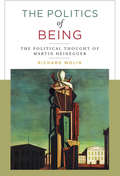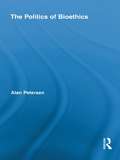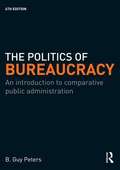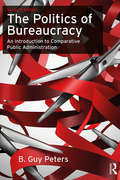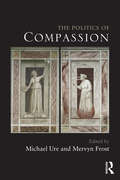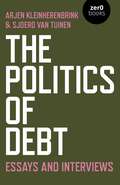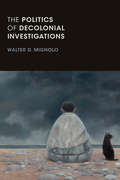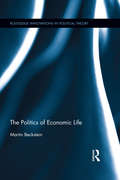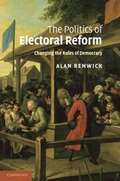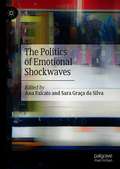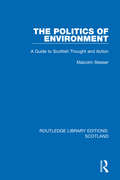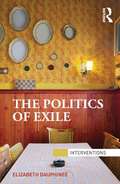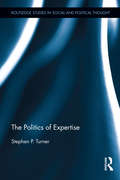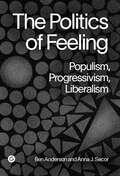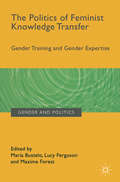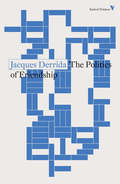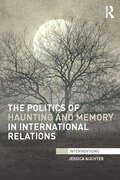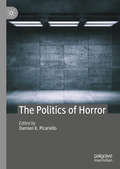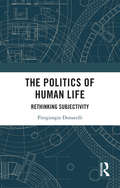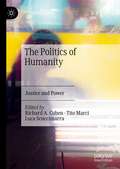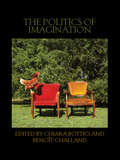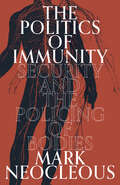- Table View
- List View
The Politics of Being: The Political Thought of Martin Heidegger
by Richard WolinMartin Heidegger's ties to Nazism have tarnished his stature as one of the towering figures of twentieth-century philosophy. The publication of the Black Notebooks in 2014, which revealed the full extent of Heidegger's anti-Semitism and enduring sympathy for National Socialism, only inflamed the controversy. Richard Wolin's The Politics of Being: The Political Thought of Martin Heidegger has played a seminal role in the international debate over the consequences of Heidegger's Nazism. In this edition, the author provides a new preface addressing the effect of the Black Notebooks on our understanding of the relationship between politics and philosophy in Heidegger's work. Building on his pathbreaking interpretation of the philosopher's political thought, Wolin demonstrates that philosophy and politics cannot be disentangled in Heidegger's oeuvre. Völkisch ideological themes suffuse even his most sublime philosophical treatises. Therefore, despite Heidegger's profundity as a thinker, his critique of civilization is saturated with disturbing anti-democratic and anti-Semitic leitmotifs and claims.
The Politics of Bioethics (Routledge Studies in Science, Technology and Society)
by Alan PetersenRecent rapid advances in the biosciences have led to considerable debate about the social, ethical, and legal implications of research and its applications. The mapping of the human genome, advances in cloning techniques, the harvesting of embryonic stem cells for research, increasing use of genetic testing in healthcare, and the development of large-scale genetic databases have not only generated high expectations about new diagnostics and treatments but also considerable widespread fear about their consequences. This book offers a critical appraisal of bioethics and its implications as it pertains to the fields of health and medicine and public health, with a particular emphasis on recent technological innovations as they provide a noteworthy exemplar of the power of bioethics in shaping policies, practices and notions of societal benefits. Whereas other books have tended to examine ethical dilemmas and challenges of applying ethical principles, often in relation to a limited array of issues, this book investigates the socio-political implications of bioethics discourse and practices in relation to a range of controversial (or potentially controversial) developments. Providing a benchmark for future debate and scholarly work, this volume will be of interest to policymakers, clinicians, scholars, and others who are looking for new ways of making sense and evaluating recent developments in the field of bioethics.
The Politics of Bureaucracy: An Introduction to Comparative Public Administration
by B. Guy PetersWritten by a leading authority in the field, this comprehensive exploration of the political and policy-making roles of public bureaucracies is now available in a fully revised sixth edition, offering extensive, well documented comparative analysis of the effects of politics on bureaucracy. New to the 6th edition: More international case studies on North America, Western and Eastern European and Asian countries. Discussion of how governments have been developing strategies to enhance co-ordination and coherence across their programmes. Analysis of the use of performance management in public administration. More tables, case studies and internet links. Extensive revision and updating to take into account the wealth of new literature that has emerged in recent years, including a discussion of E-Governance and analysis of 'new public management'. Drawing on evidence from a wide variety of political systems, The Politics of Bureaucracy continues to be essential reading for all students of government, policy analysis, and politics and international relations.
The Politics of Bureaucracy: An Introduction to Comparative Public Administration
by B. Guy PetersWritten by B. Guy Peters, a leading authority in the field, this comprehensive exploration of the political and policy making roles of public bureaucracies is now available in a fully revised seventh edition, offering extensive, well-documented comparative analysis of the effects of politics on bureaucracy. Updates to this edition include: All new coverage of public administration in Latin America and Africa, with special attention paid to the impact of New Public Management and other ideas for reform; An examination of the European Union and its effects on public policy and public administration in member countries, as well as an exploration of the EU as a particular type of bureaucracy; A renewed emphasis on coordination and the role of central agencies; A thorough assessment of 'internationalization' of bureaucracies and concerns with the role of international pressures on domestic governments and organizations in the public sector; Coverage of the wide-ranging impacts of the 2008 economic slowdown on public bureaucracies and public policies, and the varied success of governmental responses to the crisis. Drawing on evidence from a wide variety of political systems, The Politics of Bureaucracy, Seventh Edition, continues to be essential reading for all students of government, policy analysis, politics, and international relations.
The Politics of Compassion
by Mervyn Frost Michael UreThis book provides a critical overview of the role of the emotions in politics. Compassion is a politically charged virtue, and yet we know surprisingly little about the uses (and abuses) of compassion in political environments. Covering sociology, political theory and psychology, and with contributions from Martha Nussbaum and Andrew Linklater amongst others, the book gives a succinct overview of the main theories of political compassion and the emotions in politics. It covers key concepts such as humanitarianism, political emotion and agency in relation to compassion as a political virtue. The Politics of Compassion is a fascinating resource for students and scholars of political theory, international relations, political sociology and psychology.
The Politics of Corruption in Dictatorships
by Vineeta Yadav Bumba Mukherjee Yadav, Vineeta and Mukherjee, BumbaThe Politics of Corruption in Dictatorships studies how institutional and social factors influence corruption in dictatorships. Dictatorships are often synonymous with high levels of corruption, yet Vineeta Yadav and Bumba Mukherjee argue otherwise. The authors ask why corruption has declined in some but not other authoritarian regimes. What are the main political factors that drive some autocrats to curb corruption? The book explores the role that business mobilization can play in reducing corruption under some conditions in dictatorships. It investigates how political competition for an elected legislature affects the incentives of dictators to engage in corruption. The study relies on case studies from Jordan, Malaysia, and Uganda. The book is accessible to a wide audience without requiring sophisticated statistical training.
The Politics of Debt: Essays and Interviews
by Sjoerd van Tuinen Arjen KleinherenbrinkThe Politics of Debt brings together philosophers, political scientists, and economists and sets them the task of reflecting on the political role played by debt. Focusing on the aftermath of the 2008 economic crisis, particularly in the United States and Europe, the book is split into groups. It contains six essays and five interviews that aim to fully comprehend the political consequences of the economic crisis and specifically of debt.
The Politics of Decolonial Investigations (On Decoloniality)
by Walter D. MignoloIn The Politics of Decolonial Investigations Walter D. Mignolo provides a sweeping examination of how coloniality has operated around the world in its myriad forms from the sixteenth century to the twenty-first. Decolonial border thinking allows Mignolo to outline how the combination of the self-fashioned narratives of Western civilization and the hegemony of Eurocentric thought served to eradicate all knowledges in non-European languages and praxes of living and being. Mignolo also traces the geopolitical origins of racialized and gendered classifications, modernity, globalization, and cosmopolitanism, placing them all within the framework of coloniality. Drawing on the work of theorists and decolonial practitioners from the Global South and the Global East, Mignolo shows how coloniality has provoked the emergence of decolonial politics initiated by delinking from all forms of Western knowledge and subjectivities. The urgent task, Mignolo stresses, is the epistemic reconstitution of categories of thought and praxes of living destituted in the very process of building Western civilization and the idea of modernity. The overcoming of the long-lasting hegemony of the West and its distorted legacies is already underway in all areas of human existence. Mignolo underscores the relevance of the politics of decolonial investigations, in and outside the academy, to liberate ourselves from canonized knowledge, ways of knowing, and praxes of living.
The Politics of Economic Life (Routledge Innovations in Political Theory)
by Martin BecksteinIn recent years, economic life has become increasingly politicized: now, every company has a ‘philosophy’, promising its customers some ethical surplus in return for buying their products; consumers shop for change; workers engage in individualized forms of employee activism such as whistleblowing; and governments contribute to the re-configuration of the economic sphere as a site of political contestation by reminding corporate and private economic actors of their duty to ‘do their bit’. The Politics of Economic Life addresses this trend by exploring the ways in which practices of consumption, work, production, and entrepreneurship are imbued with political strategy and ideology, and assesses the potentials and perils of the politicization of economic activity for democracy in the 21st century.
The Politics of Educational Reform in Ghana: Understanding Structural Persistence in the Secondary School System (Critical Studies of Education #7)
by Maxwell A. AziabahThis book comprises six main chapters and addresses the core research question: How can the endurance of academic bias in Ghana’s secondary education system be explained in the context of educational reform versus change of government concurrence? Six sub-questions have subsequently been derived from the core research question, enabling a comprehensive and rigorous treatment of the subject matter of investigation. The manuscript adopts an historical institutionalism approach, combining path dependency with partisan theory in explicating structural persistence in the secondary school system in Ghana. A case study methodological design procedure has been employed in the investigation of three episodes of educational reform, anchored on qualitative content analysis as the main data reduction mechanism.
The Politics of Electoral Reform
by Alan RenwickElections lie at the heart of democracy, and this book seeks to understand how the rules governing those elections are chosen. Drawing on both broad comparisons and detailed case studies, it focuses upon the electoral rules that govern what sorts of preferences voters can express and how votes translate into seats in a legislature. Through detailed examination of electoral reform politics in four countries (France, Italy, Japan and New Zealand), Alan Renwick shows how major electoral system changes in established democracies occur through two contrasting types of reform process. Renwick rejects the simple view that electoral systems always straightforwardly reflect the interests of the politicians in power. Politicians' interests are complex; politicians are sometimes unable to pursue reforms they want; occasionally, they are forced to accept reforms they oppose. The Politics of Electoral Reform shows how voters and reform activists can have real power over electoral reform.
The Politics of Eloquence
by Marc HanveltHistory has shown us that the power of political speech can be put to both positive and manipulative ends - while rhetoric is a powerful tool for those who seek to persuade others to adopt their views, it can also be employed to foment factionalism and undermine the very basis of a democratic society. In this unique study, Marc Hanvelt shows how eighteenth-century philosopher David Hume confronted questions about the negative moral and political effects of rhetoric, and how he differentiated between manipulative and non-manipulative political speech.Drawing on Hume's philosophical, historical, and popular writings, The Politics of Eloquence presents an understanding of rhetoric that can be properly ascribed to this important thinker, an understanding hitherto overlooked in the scholarly literature. Offering an original approach to thinking about political rhetoric - an essential element of democratic politics - Hanvelt makes important contributions to both Hume scholarship and to broader areas in political theory and philosophy.
The Politics of Emotional Shockwaves
by Ana Falcato Sara Graça da SilvaThis interdisciplinary volume brings together specialists from different backgrounds to deliver expert views on the relationship between morality and emotion, putting a special emphasis on issues related to emotional shocks. One of the distinctive aspects of social existence today is our subjection to traumatic events on a global scale, and our subsequent embodiment of the emotional responses these events provoke. Covering various methodological angles, the contributors ensure careful and heterogeneous reflection on this delicate topic. With eleven original essays, the collection spans a wide variety of fields from philosophy and literary theory, to the visual arts, history, and psychology. The authors cover diverse themes, including philosophical approaches to political polarization; the impact of negative emotions such as anger on inter-relational balance; humour and politics; media and the idea of progress; photography and trauma discourse; democratic morality in modern Indian society; emotional olfactory experiences; phenomenological readings of spatial disorientation, and the significance of moral shocks. This timely volume offers crucial perspectives on contemporary questions relating to ethical behaviours, and the challenges of a globalized society on the verge of political, financial and emotional collapse.
The Politics of Environment: A Guide to Scottish Thought and Action (Routledge Library Editions: Scotland #28)
by Malcolm SlesserOriginally published in 1972 and ahead of its time in many respects this book was the first to take a constructive approach to the problems facing the human race in the 20th Century. It remains enduringly relevant today and discusses over-population, under-employment, atmospheric pollution, exhaustion of global resources and geo-politics. It shows how all these issues are inter-connected and therefore how conventional attempts to solve some of them merely exacerbate others. It asserts that the solution rests in the evolution of a realistic form of politics which puts the community first.
The Politics of Exile (Interventions)
by Elizabeth Dauphinee"The most thought-provoking and refreshing work on Bosnia and the former Yugoslavia in a long time.It is certainly an immense contribution to the broadening schools within international relations." Times Higher Education (THE). Written in both autoethnographical and narrative form, The Politics of Exile offers unique insight into the complex encounter of researcher with research subject in the context of the Bosnian War and its aftermath. Exploring themes of personal and civilizational guilt, of displaced and fractured identity, of secrets and subterfuge, of love and alienation, of moral choice and the impossibility of ethics, this work challenges us to recognise pure narrative as an accepted form of writing in international relations. The author brings theory to life and gives corporeal reality to a wide range of concepts in international relations, including an exploration of the ways in which young academics are initiated into a culture where the volume of research production is more valuable than its content, and where success is marked not by intellectual innovation, but by conformity to theoretical expectations in research and teaching. This engaging work will be essential reading for all students and scholars of international relations and global politics.
The Politics of Expertise (Routledge Studies in Social and Political Thought #82)
by Stephen P. TurnerThis book collects case studies and theoretical papers on expertise, focusing on four major themes: legitimation, the aggregation of knowledge, the distribution of knowledge and the distribution of power. It focuses on the institutional means by which the distribution of knowledge and the distribution of power are connected, and how the problems of aggregating knowledge and legitimating it are solved by these structures. The radical novelty of this approach is that it places the traditional discussion of expertise in democracy into a much larger framework of knowledge and power relations, and in addition begins to raise the questions of epistemology that a serious account of these problems requires.
The Politics of Feeling: Populism, Progressivism, Liberalism (Goldsmiths Press / PERC Papers)
by Ben Anderson Anna J. SecorHow today&’s dominant political forms—right-wing populism, progressivism, and liberalism—offer differentiated responses to shared conditions of uncertainty.The Politics of Feeling argues that politics has become a matter of political feelings in an age of uncertainty. The uncertainties of the post-2008 period have transformed the political arena and made the question of how people feel central to the formation of political affiliations and divisions. The book identifies three competing political forms in the US and the UK today: right-wing populism, progressivism, and contemporary liberalism. It argues that rather than naming coherent programs of political thought, these popular political forms are operating as arrangements or modes of attachment and political intensity. Each one suggests a different way of remembering the past, imagining the future, and making the present politically meaningful. Each one elevates some affective orientations over others and thereby etches differences of race, class, and gender within its structure. The Politics of Feeling is a critique of the living edge of politics, where feelings emerge, gather intensity, or dissolve in the continual making and remaking of the politics of the present.
The Politics of Feminist Knowledge Transfer: Gender Training and Gender Expertise (Gender and Politics)
by Maxime Forest Lucy Ferguson Mar�a BusteloThe Politics of Feminist Knowledge Transfer draws together analytical work on gender training and gender expertise. Its chapters critically reflect on the politics of feminist knowledge transfer, understood as an inherently political, dynamic and contested process, the overall aim of which is to transform gendered power relations in pursuit of more equal societies, workplaces, and policies. At its core, the work explores the relationship between gender expertise, gender training, and broader processes of feminist transformation arising from knowledge transfer activities. Examining these in a reflective way, the book brings a primarily practice-based debate into the academic arena. With contributions from authors of diverse backgrounds, including academics, practitioners and representatives of gender training institutions, the editors combine a focus on gender expertise and gender training, with more theory-focused chapters.
The Politics of Friendship (Radical Thinkers Ser. #Vol. 5)
by Jacques Derrida"O, my friends, there is no friend." The most influential of contemporary philosophers explores the idea of friendship and its political consequences, past and future. Until relatively recently, Jacques Derrida was seen by many as nothing more than the high priest of Deconstruction, by turns stimulating and fascinating, yet always somewhat disengaged from the central political questions of our time. Or so it seemed. Derrida&’s &“political turn,&” marked especially by the appearance of Specters of Marx, has surprised some and delighted others. In The Politics of Friendship Derrida renews and enriches this orientation through an examination of the political history of the idea of friendship pursued down the ages. Derrida&’s thoughts are haunted throughout the book by the strange and provocative address attributed to Aristotle, &“my friends, there is no friend&” and its inversions by later philosophers such as Montaigne, Kant, Nietzsche, Schmitt and Blanchot. The exploration allows Derrida to recall and restage the ways in which all the oppositional couples of Western philosophy and political thought—friendship and enmity, private and public life—have become madly and dangerously unstable. At the same time he dissects genealogy itself, the familiar and male-centered notion of fraternity and the virile virtue whose authority has gone unquestioned in our culture of friendship and our models of democracy The future of the political, for Derrida, becomes the future of friends, the invention of a radically new friendship, of a deeper and more inclusive democracy. This remarkable book, his most profoundly important for many years, offers a challenging and inspiring vision of that future.
The Politics of Haunting and Memory in International Relations (Interventions)
by Jessica AuchterInternational Relations has traditionally focused on conflict and war, but the effects of violence including dead bodies and memorialization practices have largely been considered beyond the purview of the field. Drawing on Jacques Derrida’s notion of hauntology to consider the politics of life and death, Auchter traces the story of how life and death and a clear division between the two is summoned in the project of statecraft. She argues that by letting ourselves be haunted, or looking for ghosts, it is possible to trace how statecraft relies on the construction of such a dichotomy. Three empirical cases offer fertile ground for complicating the picture often painted of memorialization: Rwandan genocide memorials, the underexplored case of undocumented immigrants who die crossing the US-Mexico border, and the body/ruins nexus in 9/11 memorialization. Focusing on the role of dead bodies and the construction of particular spaces as the appropriate sites for memory to be situated, it offers an alternative take on the new materialisms movement in international relations by asking after the questions that arise from an ethnographic approach to the subject: viewing things from the perspective of dead bodies, who occupy the shadowy world of post-conflict international politics. This work will be of great interest to students and scholars of critical international relations, security studies, statecraft and memory studies.
The Politics of Horror
by Damien K. PicarielloThe Politics of Horror features contributions from scholars in a variety of fields—political science, English, communication studies, and others—that explore the connections between horror and politics. How might resources drawn from the study of politics inform our readings of, and conversations about, horror? In what ways might horror provide a useful lens through which to consider enduring questions in politics and political thought? And what insights might be drawn from horror as we consider contemporary political issues? In turning to horror, the contributors to this volume offer fresh provocations to inform a broad range of discussions of politics.
The Politics of Human Life: Rethinking Subjectivity
by Piergiorgio DonatelliThis book centres on the notion of human life that lies at the foundation of contemporary thinking in the areas of ethics, law and politics. Centrally, the book addresses the deep divide, characteristic of this thinking, between: on the one hand, those who wish to do away with any anthropological understandings of the human, and appeal to mere facts delivered by science; and, on the other hand, critics who defend an anthropological understanding of human life that is tied to traditional, teleological, metaphysics. In short: knowledge of the world is given over to the sciences and moral theory is considered to operate in a distinct, and insulated, domain. But this opposition has, Piergiorgio Donatelli argues here, outlived its usefulness. Through a discussion of the intimate human spheres of reproduction, dying and sexuality, he argues that we now live in a world characterized by new ways of living: by novel rearrangements of emotions, and by the modification, and in some cases a radical rupture in, existing ideas of human life. These shifts challenge any established separation between facts and norms, between human life and its conceptualization. As such, it is argued here, they simultaneously offer the possibility of a new, socially articulated, understanding of the relationship between subjectivity and normativity. Engaging pressing contemporary themes, this book will be invaluable to scholars in the fields of ethics, law and political theory, and both analytic and continental philosophy.
The Politics of Humanity: Justice and Power
by Richard A. Cohen Tito Marci Luca ScuccimarraThis book is the collaborative response of engaged scholars from diverse countries and disciplines who are disturbed by the contemporary resurgence of anti-democratic movements and regimes throughout the world. These movements have manifest in vitriolic “nationalist” polemics, state-supported violence, and exclusionary anti-immigrant policies, less than a century after the rise and fall and horrific devastations of fascism in the early 20th century.
The Politics of Imagination (Birkbeck Law Press)
by Chiara Bottici Benoît ChallandThe Politics of Imagination offers a multidisciplinary perspective on the contemporary relationship between politics and the imagination. What role does our capacity to form images play in politics? And can we define politics as a struggle for people’s imagination? As a result of the increasingly central place of the media in our lives, the political role of imagination has undergone a massive quantitative and a qualitative change. As such, there has been a revival of interest in the concept of imagination, as the intimate connections between our capacity to form images and politics becomes more and more evident. Bringing together scholars from different disciplines and theoretical outlooks, The Politics of Imagination examines how the power of imagination reverberates in the various ambits of social and political life: in law, history, art, gender, economy, religion and the natural sciences. And it will be of considerable interest to those with contemporary interests in philosophy, political philosophy, political science, legal theory, gender studies, sociology, nationalism, identity studies, cultural studies, and media studies.
The Politics of Immunity: Security and the Policing of Bodies
by Mark NeocleousThe violence and destruction hiding behind the obsession with immunityOur contemporary political condition is obsessed with immunity. The immunity of bodies and the body politic; personal immunity and herd immunity; how to immunize the social system against breakdown. The obsession intensifies with every new crisis and the mobilization of yet more powers of war and police, from quarantine to border closures and from vaccination certificates to immunological surveillance.Engaging four key concepts with enormous cultural weight – Cell, Self, System and Sovereignty – Politics of Immunity moves from philosophical biology to intellectual history and from critical theory to psychoanalysis to expose the politics underpinning the way immunity is imagined. At the heart of this imagination is the way security has come to dominate the whole realm of human experience. From biological cell to political subject, and from physiological system to the social body, immunity folds into security, just as security folds into immunity. The book thus opens into a critique of the violence of security and spells out immunity&’s tendency towards self-destruction and death: immunity, like security, can turn its aggression inwards, into the autoimmune disorder.Wide-ranging and polemical, Politics of Immunity lays down a major challenge to the ways in which the immunity of the self and the social are imagined.
